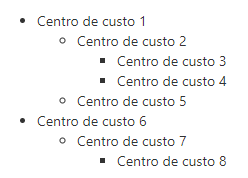Oi, estou tentando criar um método de forma recursiva, que me mostre todos os centros de custo filhos, por exemplo:

Se o pai for o centro de custo 1, ira me retornar o 3, 4 e 5.
Não tenho pratica nenhum com recursividade, mas vou por abaixo o fonte que tentei até agora.
public class Teste {
public static List<CentroCusto> centroCustos = new ArrayList<>();
public static List<CentroCusto> centroCustos2 = new ArrayList<>();
public static void main(String[] args) {
build();
CentroCusto c1 = new CentroCusto();
c1.setId(1L);
buscarFilhos(c1);
System.out.println(centroCustos2);
}
private static CentroCusto buscarFilhos(CentroCusto ccu) {
if (!centroCustos.stream().map(CentroCusto::getCentroCustoPai).filter(Objects::nonNull).anyMatch(centroCusto -> centroCusto.getId().equals(ccu.getId()))) {
centroCustos2.add(ccu);
return ccu;
}
for (CentroCusto centroCusto : centroCustos) {
if (Objects.nonNull(centroCusto.getCentroCustoPai()) && centroCusto.getCentroCustoPai().getId().equals(ccu.getId())) {
return buscarFilhos(centroCusto);
}
}
return null;
}
private static void build() {
CentroCusto c1 = new CentroCusto();
c1.setId(1L);
CentroCusto c2 = new CentroCusto();
c2.setId(2L);
c2.setCentroCustoPai(c1);
CentroCusto c3 = new CentroCusto();
c3.setId(3L);
c3.setCentroCustoPai(c2);
CentroCusto c4 = new CentroCusto();
c4.setId(4L);
c4.setCentroCustoPai(c2);
CentroCusto c5 = new CentroCusto();
c5.setId(5L);
c5.setCentroCustoPai(c1);
CentroCusto c6 = new CentroCusto();
c6.setId(6L);
CentroCusto c7 = new CentroCusto();
c7.setId(7L);
c7.setCentroCustoPai(c6);
CentroCusto c8 = new CentroCusto();
c8.setId(8L);
c8.setCentroCustoPai(c7);
centroCustos.add(c1);
centroCustos.add(c2);
centroCustos.add(c3);
centroCustos.add(c4);
centroCustos.add(c5);
centroCustos.add(c6);
centroCustos.add(c7);
centroCustos.add(c8);
}
}
public class CentroCusto {
private Long id;
private CentroCusto centroCustoPai;
// Gettes e Setters
}
No CentroCusto além de ter uma referência para o pai, mantenha também uma referência para os filhos, veja:
import java.util.LinkedList;
import java.util.List;
public class CentroCusto {
private Long id;
private CentroCusto pai;
private List<CentroCusto> filhos = new LinkedList<>();
public List<CentroCusto> getFilhos() {
return filhos;
}
public CentroCusto getPai() {
return pai;
}
public Long getId() {
return id;
}
public void setPai(CentroCusto pai) {
pai.filhos.add(this);
this.pai = pai;
}
public void setId(Long id) {
this.id = id;
}
}
Aí fica bem fácil:
import java.util.ArrayList;
import java.util.List;
public class Teste {
public static List<CentroCusto> centroCustos = new ArrayList<>();
public static void main(String[] args) {
build();
for (CentroCusto cc : centroCustos) {
imprimir(cc);
}
}
private static void imprimir(CentroCusto cc) {
imprimirRecursivamente("", cc);
}
private static void imprimirRecursivamente(String indent, CentroCusto cc) {
System.out.println(indent + "Centro de custo " + cc.getId());
for (CentroCusto filho : cc.getFilhos()) {
imprimirRecursivamente(" " + indent, filho);
}
}
private static void build() {
CentroCusto c1 = new CentroCusto();
c1.setId(1L);
CentroCusto c2 = new CentroCusto();
c2.setId(2L);
c2.setPai(c1);
CentroCusto c3 = new CentroCusto();
c3.setId(3L);
c3.setPai(c2);
CentroCusto c4 = new CentroCusto();
c4.setId(4L);
c4.setPai(c2);
CentroCusto c5 = new CentroCusto();
c5.setId(5L);
c5.setPai(c1);
CentroCusto c6 = new CentroCusto();
c6.setId(6L);
CentroCusto c7 = new CentroCusto();
c7.setId(7L);
c7.setPai(c6);
CentroCusto c8 = new CentroCusto();
c8.setId(8L);
c8.setPai(c7);
centroCustos.add(c1);
centroCustos.add(c2);
centroCustos.add(c3);
centroCustos.add(c4);
centroCustos.add(c5);
centroCustos.add(c6);
centroCustos.add(c7);
centroCustos.add(c8);
}
}
Saída do programa:
Centro de custo 1
Centro de custo 2
Centro de custo 3
Centro de custo 4
Centro de custo 5
Centro de custo 2
Centro de custo 3
Centro de custo 4
Centro de custo 3
Centro de custo 4
Centro de custo 5
Centro de custo 6
Centro de custo 7
Centro de custo 8
Centro de custo 7
Centro de custo 8
Centro de custo 8
1 curtida
Obrigado pela solução @staroski ficou top, mas infelizmente eu vou precisar resolver essa questão sem alterar a classe CentroCusto 
@staroski Eu alterei o seu fonte e acho que consegui, dá uma olhada, acho que tá certo, obrigado 
public class Teste {
public static List<CentroCusto> centroCustos = new ArrayList<>();
public static List<CentroCusto> centroCustos2 = new ArrayList<>();
public static void main(String[] args) {
build();
CentroCusto c1 = centroCustos.get(0);
imprimirRecursivamente(c1);
for (CentroCusto centroCusto : centroCustos2) {
if (isFilho(centroCusto)) {
System.out.println(centroCusto.getId() + " é filho.");
}
}
}
private static void imprimirRecursivamente(CentroCusto cc) {
for (CentroCusto filho : getFilhos(cc)) {
imprimirRecursivamente(filho);
centroCustos2.add(filho);
}
}
private static List<CentroCusto> getFilhos(CentroCusto cc) {
List<CentroCusto> ccus = new ArrayList<>();
for (CentroCusto centroCusto : centroCustos) {
if (Objects.nonNull(centroCusto.getCentroCustoPai()) &&
centroCusto.getCentroCustoPai().getId().equals(cc.getId())) {
ccus.add(centroCusto);
}
}
return ccus;
}
private static boolean isFilho(CentroCusto ccu) {
return !centroCustos.stream().map(CentroCusto::getCentroCustoPai).filter(Objects::nonNull).anyMatch(centroCusto -> centroCusto.getId().equals(ccu.getId()));
}
private static void build() {
CentroCusto c1 = new CentroCusto();
c1.setId(1L);
CentroCusto c2 = new CentroCusto();
c2.setId(2L);
c2.setCentroCustoPai(c1);
CentroCusto c3 = new CentroCusto();
c3.setId(3L);
c3.setCentroCustoPai(c2);
CentroCusto c4 = new CentroCusto();
c4.setId(4L);
c4.setCentroCustoPai(c2);
CentroCusto c5 = new CentroCusto();
c5.setId(5L);
c5.setCentroCustoPai(c1);
CentroCusto c6 = new CentroCusto();
c6.setId(6L);
CentroCusto c7 = new CentroCusto();
c7.setId(7L);
c7.setCentroCustoPai(c6);
CentroCusto c8 = new CentroCusto();
c8.setId(8L);
c8.setCentroCustoPai(c7);
centroCustos.add(c1);
centroCustos.add(c2);
centroCustos.add(c3);
centroCustos.add(c4);
centroCustos.add(c5);
centroCustos.add(c6);
centroCustos.add(c7);
centroCustos.add(c8);
}
}


